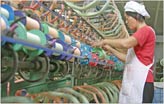Technology
Taomee Holdings goes public at 'low' $9 a share
Updated: 2011-06-10 14:17
By David Gaffen and Clare Baldwin (China Daily)
NEW YORK - A Chinese company operating a website for children, which disclosed major gaps in its internal controls, priced shares in its initial public offering at the bottom of an expected range on Wednesday.
Taomee Holdings Ltd sold 7.2 million American Depositary Shares for $9 each, raising $64.7 million, an underwriter told Reuters. It had planned to sell shares for $9 to $11 each.
The company is coming to market just as US-listed Chinese companies and the reliability of their accounts are coming under more scrutiny following a series of accounting scandals.
A number of Chinese stocks took a beating in trading on Wednesday after Interactive Brokers Group Inc said earlier this week it would prohibit clients from borrowing money to take leveraged positions on 160 Chinese securities, and discount brokerage TD Ameritrade said it is closely monitoring Chinese stocks in the United States.
Taomee, which operates a social networking and entertainment site for children that features virtual worlds including one with cuddly moles, said in the risk factors section of its initial public offering prospectus that its auditors found major gaps in its internal controls.
In the prospectus, the company said the company and its auditors found "significant deficiencies in our internal control over financial reporting" and that it lacked enough expertise to comply with US accounting rules.
"The material weakness observed was our lack of sufficient accounting resources and expertise necessary to comply with US GAAP (Generally Accepted Accounting Principles) and to prepare and review financial statements and related financial disclosures under US GAAP for SEC (Securities and Exchange Commission) reporting and compliance purposes," Taomee said.
That is not unusual for a Chinese company but could still raise fears among investors who have been shunning an increasing number of Chinese companies listed on the New York Stock Exchange and Nasdaq markets due to growing worries about accounting scandals.
Renren, another Chinese social networking company that went public in the United States in May, announced that its audit committee chairman quit just before the IPO was priced. That company also found a "material weakness" and a "significant deficiency" in its internal financial controls.
Audit committee chairman Derek Palaschuk said at the time he was quitting to protect Renren. He was also the chief financial officer of Longtop Financial, a company that was the target of a handful of critical reports by short sellers and is now being probed by US regulators, and from which he has resigned.
Among the problems Taomee found in a review of its internal financial controls were errors in the "algorithm of the software program we used to compile operating data". One of the steps the company took to remedy the problems was hiring a chief financial officer, which it did just three months ago.
Taomee, which is organized in the Cayman Islands and conducts the majority of its business in China, also said in its prospectus that the majority of its officers and directors reside outside the United States and have their assets outside of the United States, and it may be difficult to sue them.
| ||||
"The laws of the Cayman Islands and of China may render you unable to enforce a judgment against our assets or the assets of our directors and officers," the company wrote, also in the risk factors section.
Taomee declined to comment, citing a US Securities and Exchange Commission quiet period.
Renren, sometimes called the Facebook of China, went public in early May. Its shares gained 29 percent on their debut, but have since fallen, closing at $10.51, or 25 percent below their IPO price, on Wednesday.
Reuters
Specials

Wealth of difference
Rich coastal areas offer contrasting ways of dealing with country's development

Seal of approval
The dying tradition of seal engraving has now become a UNIVERSITY major

Making perfect horse sense
Riding horses to work may be the clean, green answer to frustrated car owners in traffic-trapped cities


